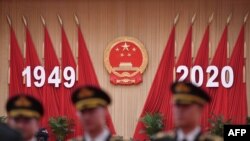U.S. lawmakers are sounding alarms about the threat from China, warning Washington has so far failed to keep up with Beijing as it emerges as a global power.
The concerns, voiced in two separate reports Wednesday, criticize U.S. intelligence agencies and policymakers for clinging too long to the notion that increased trade and interaction with China would push Beijing to eventually align itself with Western values.
Instead, the reports argue, the United States is struggling to push back as it faces a real danger of being replaced by China on the world stage.
“The stakes are high,” according to a redacted report released by Democrats on the House Intelligence Committee.
“Absent a significant realignment of resources, the U.S. government and intelligence community will fail to achieve the outcomes required to enable continued U.S. competition with China on the global stage for decades to come,” the report said.
The House Intelligence Committee report, based on hundreds of hours of interviews with intelligence officials and reviews of thousands of assessments, criticized U.S. intelligence agencies for becoming overly focused on their counterterrorism mission and for failing to adapt to the threats of a changing world.
“While the United States was busy engaging al-Qaida, ISIS [Islamic State] and their affiliates, offshoots and acolytes, Washington's unchallenged dominance over the global system slipped away,” the report said.
To better counter China and other emerging threats, the report said, U.S. intelligence agencies need to make better use of information commonly available on the internet, social media and elsewhere.
The report also said U.S. intelligence officials need to pay more attention to nonimmediate, nonmilitary threats “such as global health, economic security and climate change.”
And the report called for a greater focus on recruiting and mentoring what it described as “the next generation of China analysts.”
“The good news is that we still have time to adapt,” said House Intelligence Committee Chairman Adam Schiff in a statement. “It’s my hope that the intelligence community will work hand in hand with the congressional oversight committees to make these necessary changes quickly.”
A second report released Wednesday, by Republican lawmakers, was no less damning, recommending more than 400 changes to Washington’s China strategy.
"To preserve democracy and freedom around the world, the U.S. must act decisively with our allies to regain the initiative," the China Task Force report warned.
Chinese Communist Party ideology “is undermining the core principles of the international system and putting Americans’ safety and prosperity at risk,” it said. “Leniency and accommodation of the CCP and its oppressive agenda is no longer an option.”
The report calls on policymakers to boost counterintelligence operations against China and to make sure that the U.S. medical and national security supply chains no longer need to reply on Chinese-made goods.
It also recommends increased spending on defense to better counter Chinese nuclear capabilities as well as China’s growing conventional forces.
“For more than 40 years, we have tried to bring them into the family of nations as a responsible partner, but they have refused to behave responsibly,” China Task Force Chairman Michael McCaul said in a statement.









